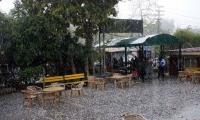and the city of Karachi.
Shahid Saati, a daily Vatan staffer, said the communities’ young people could not read or write Gujarati as their older generation could not pass it on to their next one.
“That is the reason that the circulation of the newspapers [Vatan and Millat] has been decreasing,” he added.
Researchers and community leaders say that the closure of Gujarati schools in Karachi is one of the main factors behind the disappearance of the language in written form.
Kalmati said at the time of the Partition, there were 34 Gujarati schools in the city, 23 for boys and 11 for girls.
“Many Hindu and Muslim associations before the Partition had opened Gujarati schools in different parts of the city,” he added.
However, Munshi Dhorajvi, a prominent Gujarati poet, said the language was taught in schools till 1984.
“There were 60 schools run by Gujarati-speaking communities’ associations in the city, but after their nationalisation, the government removed the language from the syllabus both as compulsory and optional,” Dhorajvi told The News.However, he added, after the denationalisation of some schools by the then Bhutto government, the community associations did not revive Gujarati in them.
“It was a great mistake they had committed at that time”. Surviving Gujarati newspapers
Currently, there are only two Gujarati dailies in Karachi.
Daily Vatan was founded in March 1942 in then Bombay and after the Partition, the newspaper became associated with the Dawn Group of Newspapers in 1947.
However, in 1997, Usman Arab Saati, a veteran journalist who had been associated with the newspaper, started it independently after he knew that the earlier publishers were planning to shut it down for good.
Similarly, daily Millat, founded by Fakhre Matri, has been in publication since 1948. After the senior Matri’s demise in 1966, his son Inquilab Matri managed it until till he passed away in January 2010.
Now, Inquilab’s daughter, Shumaila Matri, is its editor-in-chief.
The Dawn Group of Newspapers used to publish daily Dawn Gujarati but it was shut down.
The daily Vatan management had started another newspaper named Daily Gujarati.
Saati said the management was compelled to close it after a few years as it was affecting the Vatan’s publication.
In the beginning, the publishers of Vatan and Millat printed copies in thousands, but since the 1990s, the circulation of both newspapers has significantly decreased.
“In India, especially in the state of Gujrat, there are around 250 Gujarati newspapers,” said Saati,
Dhorajvi said Gujarati-speaking communities’ newer generation, which had not learnt the language in schools since 1984, could no longer read newspapers and older people, who could do so, were dying.
“It’s one of the key reasons that has decreased readers of Gujarati newspapers,” he added.
Uncertain future?
The managements of the two Gujarati newspapers fear that they will face problems finding sub-editors.
“Presently, there are very a few sub-editors, around six, working at the two newspapers, and they too are elderly. We do not have their substitutes,” said Saati. The sub-editors translate the reports submitted by reporters and press releases from Urdu to Gujarati. In the beginning, the communities’ associations sent their press releases in Gujarati.
However, now they have been sending them in Urdu. Only a few elderly leaders of some organisations still send their hand-written press releases in Gujarati.
A few years ago, the newspapers’ publishers inserted Urdu pages in the newspapers. “We made it bilingual because young people can’t read Gujarati,” Saati explained.
Though it is not a lucrative business because of the decreasing readership, the publishers are still persisting with the newspapers to preserve the legacy of their ancestors.
But Saati fears that the dearth of new readers will eventually bring about their end.
Commuters make their way along a busy street in Karachi. — AFP/FileMapping the InvisibleThe AAN Art Space & Museum...
Representational image shows the identity cards. — Geo News/FileThe decision to declare the Computerised National...
Representational image of inmates behind jail bars. — Unsplash/FileA sessions court has sentenced two men to...
The Sindh High Court building can be seen in this image. — SHC Website/FileThe Sindh High Court on Thursday issued...
Sindh Chief Minister, Syed Murad Ali Shah exchanges views with Chairman Prime Minister Youth Program Rana Mashood...
A health worker administrates polio-vaccine drops to a child during anti-polio immunisation campaign, in Hyderabad on...







